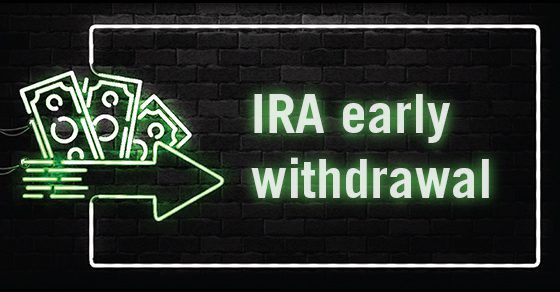 If you’re facing a serious cash shortfall, one possible solution is to take an early withdrawal from your traditional IRA. That means one before you’ve reached age 59½. For this purpose, traditional IRAs include simplified employee pension (SEP-IRA) and SIMPLE-IRA accounts.
If you’re facing a serious cash shortfall, one possible solution is to take an early withdrawal from your traditional IRA. That means one before you’ve reached age 59½. For this purpose, traditional IRAs include simplified employee pension (SEP-IRA) and SIMPLE-IRA accounts.
Here’s what you need to know about the tax implications, including when the 10% early withdrawal penalty tax might apply.
Penalty May be Avoided
In almost all cases, all or part of a withdrawal from a traditional IRA will constitute taxable income. The taxable percentage depends on whether you’ve made any nondeductible contributions to your traditional IRAs. If you have, each withdrawal from a traditional IRA consists of a proportionate amount of your total nondeductible contributions. That part is tax-free. The proportionate amount of each withdrawal that consists of deductible contributions and accumulated earnings is taxable. If you’ve never made any nondeductible contributions, 100% of a withdrawal is taxable.
Wide Variety of Exceptions
Unless one of these 11 exceptions applies, there will be a 10% early withdrawal penalty tax on the taxable portion of a traditional IRA withdrawal taken before age 59½.
- Substantially equal periodic payments (SEPPs). These are annual annuity-like withdrawals that must be taken for at least five years or until the you reach age 59½, whichever comes later. Because the SEPP rules are complicated, consult with us to avoid pitfalls.
- Withdrawals for medical expenses. If you have qualified medical expenses in excess of 7.5% of your adjusted gross income, the excess is exempt from the penalty tax.
- Higher education expense withdrawals. Early withdrawals are penalty-free to the extent of qualified higher education expenses paid during the same year.
- Withdrawals for health insurance premiums while unemployed. This exception is available to an IRA owner who has received unemployment compensation payments for 12 consecutive weeks under any federal or state unemployment compensation law during the year in question or the preceding year.
- Birth or adoption withdrawals. Penalty-free treatment is available for qualified birth or adoption withdrawals of up to $5,000 for each eligible event.
- Withdrawals for first-time home purchases. Penalty-free withdrawals are allowed to an account owner within 120 days to pay qualified principal residence acquisition costs, subject to a $10,000 lifetime limit.
- Withdrawals by certain military reservists. Early withdrawals taken by military reserve members called to active duty for at least 180 days or for an indefinite period are exempt from the 10% penalty.
- Withdrawals after disability. Early withdrawals taken by an IRA owner who is physically or mentally disabled to the extent that the owner cannot engage in his or her customary gainful activity or a comparable gainful activity are exempt from the penalty tax. The disability must be expected to lead to death or be of long or indefinite duration.
- Withdrawals to satisfy certain IRS debts. This applies to early IRA withdrawals taken to pay IRS levies against the account.
- Withdrawals after death. Withdrawals taken from an IRA after the account owner’s death are always exempt from the 10% penalty. However, this exemption isn’t available for funds rolled over into the surviving spouse’s IRA or if the surviving spouse elects to treat an IRA inherited from the deceased spouse as the spouse’s own account.
- Penalty-free withdrawals for emergencies coming soon. The SECURE 2.0 law adds a new exception for certain distributions used for emergency expenses, which are defined as unforeseeable or immediate financial needs relating to personal or family emergencies. Only one distribution of up to $1,000 is permitted a year and a taxpayer has the option to repay it within three years. This provision is effective for distributions made after December 31, 2023.
Plan Ahead
Since most or all of an early traditional IRA withdrawal will probably be taxable, it could push you into a higher marginal federal income tax bracket. You may also owe the 10% early withdrawal penalty and possibly state income tax too. Note that the penalty tax exceptions generally have additional requirements that we haven’t covered here.



